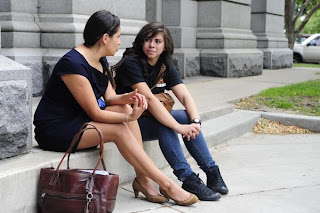
Carmen Medrano, community organizer for Together Colorado, left, talks to Yesenia, a 17-year-old undocumented student at Bruce Randolph High School who asked that her last name not be used. ( Heather Rousseau | The Denver Post)
Although Colorado education experts hesitate to predict exactly how a more lenient immigration policy may affect K-12 trends, some anticipate positive impacts on graduation, dropout rates and even student achievement.
But there seems to be agreement on at least one point: schools will need to fine-tune their academic counseling to reflect new opportunities.
The new Obama administration policy, which grants qualifying young people a two-year reprieve from deportation and the possibility of legal employment, already has encouraged many illegal immigrant students who have grown up in the U.S. shadowed by fear and uncertainty.
The timing of the directive, coinciding roughly with Metropolitan State College of Denver's announcement of a new tuition rate for those students, has prompted even higher hopes — despite the fact that the state attorney general has cast legal doubt on the Metro State move.
"This isn't the whole cake, but it's part of it," said 17-year-old Yesenia, who asked that her last name be withheld because her parents entered the U.S. from Mexico illegally when she was 3.
"It's my senior year," she added, noting that the two-year, renewable window allows her to put away more money for college. "And to have those two things lifted off of me takes away a lot of the stress."
School administrators preface any speculation by emphasizing that districts don't attempt to determine the immigration status of their students, and any conclusions they draw are largely anecdotal.
But Sandra Smyser, superintendent of Eagle County schools, said she already has heard from some recent graduates who have renewed hope for finding legal work . And she suspects younger students who have abandoned their education will now reconsider.
"We don't have a big dropout problem related to this issue," she said, "except we do know there are students out there who I believe would re-enroll and work toward graduation now, given that they can also work to support themselves as they do that."
A former principal of a high school serving immigrant students in Eagle County foresees not only an uptick in enrollment — and the accompanying state dollars — but an increased district obligation to make sure families understand the ramifications of the policy shift.
"Now, knowing that there's hope, I see an onslaught of kids coming back to school," said Kathy Brendza, who until recently headed the 62-student New America High School in Gypsum. "But I also think we're going to have to be carriers of that message. We're going to have to be clear on what this means to kids.
"It's the ticket, the golden ticket, for the rest of their lives. Especially for those children who have been in this system since kindergarten."
Latin American Educational Foundation director Jim Chavez, whose organization helps students plan for college and also offers scholarship help, predicted that the new policy will trigger widespread improvement in student achievement at all grade levels — and higher test scores as well.
"It's almost like a positive peer pressure by having more people pursuing and improving their academic abilities," he said. "Like a contagious effect of success."
In the Jefferson County School District, the state's largest, superintendent Cindy Stevenson imagines, at most, modest positive effect in areas like dropout and graduation rates. The most likely result, she adds, is a new sense of motivation for impacted kids — and the need to make sure guidance counselors can help them adapt to the new landscape.
"This has to sharpen our staff as far as counseling kids," Stevenson said. "It wouldn't be a structural change, but a change in how we talk to kids and motivate kids."
Counseling conversations that once took place privately now can be broached in a more straightforward way, said Mike Epke, principal of the 412-student New America charter in the Mapleton Public Schools.
But the most positive aspect of the new policy will be the "intrinsic motivation, the internal drive" for students to press on with their education, he added.
"Schools like New America or other traditional schools are going to benefit when kids get more engaged," Epke said, "and have that light at the end of the tunnel instead of waning engagement."
One Colorado teen said many of her peers would meet the five-point criteria — including those who had given up hope and dropped out of school. Some of them already have vowed to resume their education in order to qualify.
"Before, a lot of them felt: Why graduate or even try in school? " said Cesiah, a 17-year-old senior at Westminster High School who arrived with her parents illegally 11 years ago. "Nothing good would happen afterward.
"This means a future for them."
Friday, June 22, 2012
Immigration policy shift creates benefits for K-12 students, schools
 9:45 PM
9:45 PM


 Posted in:
Posted in: 